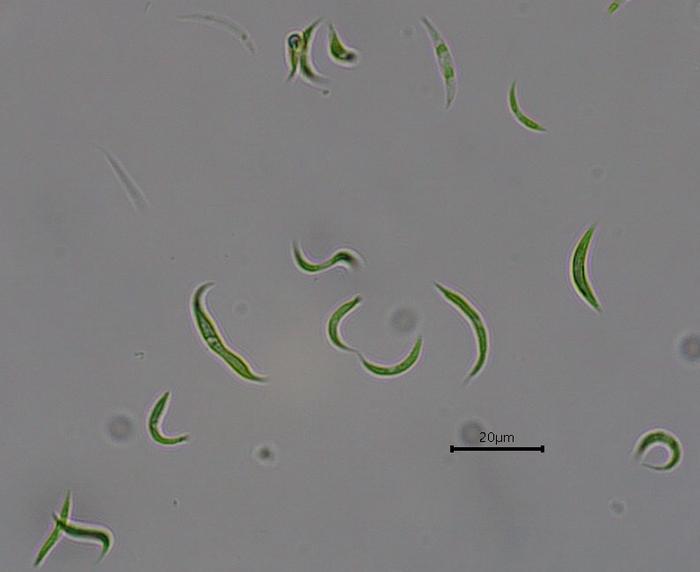
In the domain of environmental science, researchers are continually seeking innovative approaches to mitigate the persistent issue of antibiotic pollution in water bodies. A recent study highlights the remarkable capabilities of microalgae, specifically the species Monoraphidium contortum, in absorbing antibiotic residues from wastewater. This research emerges from a collaboration among scientists at three Brazilian institutions: the Federal University of ABC (UFABC), the Federal University of Itajubá (UNIFEI), and the University of São Paulo (USP). The study addresses a critical environmental concern as sewage treatment plants often fail to adequately remove pharmaceutical pollutants, leading to alarming contamination levels in ecosystems.
Microalgae have gained considerable attention due to their rapid growth and versatility, presenting a promising solution to combat the contamination of waterways. The study revealed that Monoraphidium contortum demonstrated an impressive ability to remove significant proportions of commonly used antibiotics, particularly sulfamethoxazole and trimethoprim, which are prevalent in Brazilian water sources. These antibiotics, frequently consumed but barely metabolized by humans and animals, typically enter wastewater systems unchanged, posing a potential risk to public health and ecological balance.
To examine the microalgae’s efficacy, the research team cultivated them in a controlled photobioreactor, an advanced bioreactor equipped with optimal lighting conditions that facilitate photosynthesis. Within this environment, they introduced the antibiotics to mimic the levels typically found in wastewater. Remarkably, the study found that Monoraphidium contortum could thrive even in low concentrations of these antibiotics, a significant finding considering the adverse impacts such substances can have on various organisms. The algae successfully removed between 27% and 42% of the introduced antibiotics from the medium, proving their potential as a bioremediation option.
The implications of utilizing microalgae for such bioremediation processes are profound. The biomass produced during the cultivation process possesses commercial value, potentially serving as a source of biodiesel. This dual benefit not only addresses environmental pollution but also contributes to the sustainable production of renewable energy.
Moreover, the researchers delved deeper into the genetic makeup of Monoraphidium contortum. They sequenced the organism’s genome and employed bioinformatics tools to identify a specific gene associated with the production of an enzyme that may degrade antibiotic compounds. This discovery opens the door for future research aiming to harness this biochemical pathway for enhanced pollutant removal.
Despite the promising results, the study cautions that practical applications of these findings still require additional investigation. Researchers emphasize the need to explore the efficacy of these microalgae in natural settings, particularly within sewage effluents, which present a more complex environment than the idealized conditions established in laboratory settings. Understanding how these microalgae interact with diverse contaminants in real-world scenarios will be crucial for advancing this bioremediation technology.
The broader significance of developing technologies for antibiotic removal is underscored by the growing threat of antibiotic-resistant bacteria. Pharmaceutical residues not adequately removed during conventional wastewater treatment processes may contribute to the proliferation of these resistant strains, posing substantial risks to human health. This highlights an urgent need for innovative solutions, as traditional methods such as ozonation or activated carbon adsorption often entail high operational costs and could produce harmful by-products.
In this context, microalgae-based bioremediation stands out as both an effective and economically viable solution. By integrating this approach with existing wastewater treatment technologies, we could establish a multi-faceted strategy that not only reduces pollutant levels but also enhances the sustainability of treatment facilities.
The research funded by the São Paulo Research Foundation (FAPESP) reflects Brazil’s dedication to addressing pressing environmental and public health challenges through scientific innovation. FAPESP’s commitment to supporting collaborations with international research entities demonstrates a recognition that tackling complex global problems extends beyond national borders.
As we face escalating environmental crises, the continuous exploration of sustainable practices becomes paramount. With substantial findings indicating that Monoraphidium contortum has the potential to detoxify antibiotic-laden wastewater, the scientific community is urged to prioritize further investigation into the practical applications of this bioremediation technique. The urgency of finding solutions to antibiotic contamination cannot be overstated, and innovative methodologies like this hold the promise of protecting both ecosystems and public health, making it a crucial area for ongoing research and development.
From the cultivation and application of microalgae to the genomic exploration of their capabilities, this research exemplifies the potential of interdisciplinary approaches in advancing environmental remediation strategies. The pathway to implementing these findings in real-world applications remains, but the groundwork laid by this research paints an encouraging picture of what the future may hold for bioremediation efforts. As scientists continue to unlock the myriad benefits offered by organisms like Monoraphidium contortum, the potential for creating cleaner, healthier environments grows ever closer.
In addition, the study presents a framework for further inquiries into the nuanced interactions between microalgae and various pollutants. Future research could extend to examining different strains of microalgae and assessing their effectiveness in other regions with diverse ecological challenges. By expediting this line of inquiry, we could revolutionize waste treatment and redefine our approach to ecological conservation.
Ultimately, the quest for innovative solutions to combat the pervasive issue of water pollution is a testament to human ingenuity. As the study reveals, pivotal discoveries in science can emerge from focused collaboration, prompting a collective effort in safeguarding our planet’s natural resources for future generations.
Subject of Research: Bioremediation of antibiotic residues from wastewater using microalgae
Article Title: Unveiling the antibiotics removal ability of Monoraphidium contortum
News Publication Date: 17-Feb-2025
Web References: http://dx.doi.org/10.1016/j.bej.2025.109686
References: The Biochemical Engineering Journal
Image Credits: Marcelo Chuei Matsudo
Keywords
Bioremediation, Microalgae, Antibiotics, Environmental Engineering, Environmental Management.
Tags: antibiotic contamination in ecosystemsantibiotic residues in waterBrazilian environmental researchecological health and safetyenvironmental pollution mitigationmicroalgae antibiotic removalMonoraphidium contortum studypharmaceutical pollutants removalphotobioreactor cultivationsewage treatment challengessustainable wastewater solutionswastewater treatment innovations





